

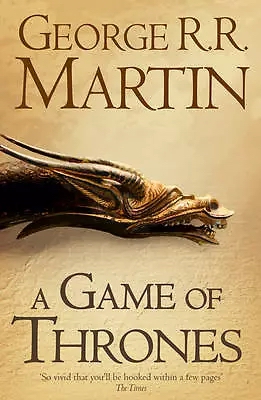
"A Game Of Thrones" - paperback front cover
George RR Martin began writing stories in his childhood and never stopped. He read Tolkien and other heroic legends at 12 and was a great fan of Marvel Comics and Stan Lee in particular. He obtained a B.S. and an M.S. in journalism at 21 but made his living writing science fiction short stories and running chess tournaments. When the chess fever of the 70s died down he took a job teaching English and journalism to supplement the inadequate returns from his writing. At 31 he resolved to work on his writing full-time and moved to Santa Fe, New Mexico to do that, where he wrote SF and Horror.
He struggled to make a living however until he was offered a job writing on the revival of "The Twilight Zone". He stayed in Hollywood working as a story consultant and then a writer-producer. He worked as a writer on the "Wild Cards" series in the late 80s.
By 1991 he was so frustrated by Hollywood not actually making any of the pilots and screenplays that he had been working on that he decided to drop all that stuff and just work on a great novel of epic fantasy without the constraints imposed by the studios. He would write the book that HE envisaged, that would be as long and complex as HE wanted with all the bizarre and shocking events and characters that HE wanted to put in!
That work is "A Song Of Ice And Fire" of which "A Game Of Thrones", (first published in 1996,) is the first volume in an, (as of 2025,) unfinished series of 7. It is that volume that I will be reviewing here. Although the first volume was a sleeper, its successors have all been best sellers. The series has been a huge hit with legions of fans and has spawned its own fantasy sub-genre: "Grimdark Fantasy". It made George Martin a star! Later fantasy writers like Brandon Sanderson owe much to his leadership.
HBO obtained the rights to the series in 2007 and the first episode of their adaptation was released in 2011. They named the entire video series: "A Game Of Thrones" even though that is just the name of the first book. The series went on to be worldwide smash and many of my friends talked about it. I refused to watch it at the time as I was wary of anyone that people were claiming to be "The New Tolkien". I didn't read the books either, for the same reason.
Once the video series was finished however, I was looking for something to watch while doing my workout and decided to give it a go. It never really grabbed me but the high production values, quality acting, convincing battles and political intrigue kept me going to the end. I was repulsed by the endless parade of shock tactics and gratuitous barbarity although I found the underlying story rather good. The battle with the undead, shot entirely in the dark, was, IMO, one of the greatest pieces ever shot. I loved it! I couldn't say the same for the rest of the series however, much of which I found stupid and tedious, especially the later seasons.
Shortly after this I saw the first book on sale at a bargain price so I bought it thinking: I wonder what George Martin's writing is actually like... It won't cost me much to find out...
So can George Martin write? Absolutely! Is GOT a fun read? Yes! (If you're not squeamish...) Is it a "great" work of literature? Certainly not! Can he stand alongside Tolkien & Shakespeare? No!
Ok, let's unpack it.
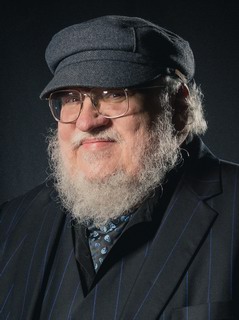
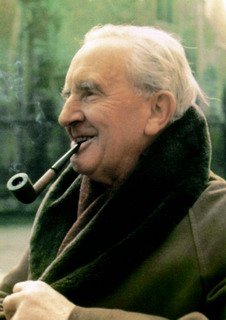
George Martin in 2017 and Ronald Tolkien in ~1970
George Raymond Martin adopted the confirmation name "Richard" at 13 years old, giving him the RR to match that of John RR Tolkien. Was this deliberate? Martin says he chose the name "Richard" after his cousin but also says that he was reading Tolkien when he was 12 and 13 and that LOTR had a great effect on him. He says that he was also influenced by HP Lovecraft, Robert Howard, Robert Heinlein and Shakespeare. He also said that "Maybe Stan Lee is the greatest literary influence on me, even more than Shakespeare or Tolkien." Be that as it may, I don't think it's much of a stretch to assume that deliberately adding an extra "R" to his monogram is an homage to Tolkien.
"A Song Of Ice And Fire" is clearly not a direct copy of "Lord Of The Rings" but it is parallel in many ways: Instead of "The Dark Lord" we have "The Night King". Instead of orcs and trolls we have undead humans and giants. There are no elves but there are the children of the forest. Instead of war between actual kingdoms we have civil war between what used to be actual kingdoms. Instead of the Valar we have the old and new gods. There is considerable political intrigue in both works although Martin took that MUCH further... No, it's not a rewrite of LOTR but they are both in the same genre.
Considering that Martin has said that his ambition was to create a long and complex work that could stand alongside Tolkien's "The Lord of the Rings" and considering that "A Song Of Ice And Fire" is a medieval war novel with magic, dragons and undead I think it is completely fair to compare GOT to LOTR and to compare Martin to Tolkien. That is what this review will mostly be about.
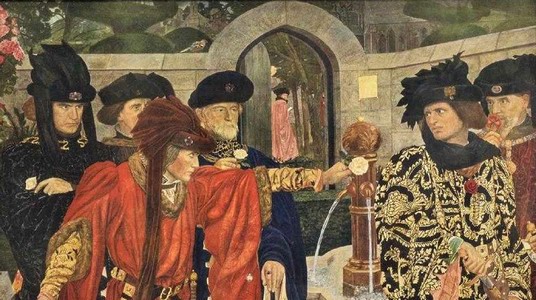
The War of the Roses: One of Martin's sources for ASOIAF
George Martin has said that loved LOTR but also that he doesn't like the all-black and all-white nature of the characters. He thinks that real people are shades of grey. This seems reasonable until you look at your friends and family. It may be different in the USA but in Australia most people have little evil in them. Yes, we have some nasty people but they are a small minority, probably less than 10% and actual psychopaths couldn't be more than 1%. Most people have done a few ugly things that they regret but only a few keep doing wrong. This is not the case in GOT, where at least half the characters are partially or completely amoral and many are bizarrely perverted or quite insane. George is from New Jersey. Perhaps that's what people are like there? I wouldn't know...
He also says that he doesn't like war stories where the entire party comes back since that is unrealistic. In real war people die. A lot of people... Well that would certainly explain why so many of his characters die. It's true that a lot of people die in war but usually much less than half of the combatants even over the entire course of the war and it varies greatly depending on whether you are fighting on your own land and whether you started it. For example: in WW2, 40% of the German Army, 29% or the USSR Army, 17% of the French Army, 11% of the British Army and only 2% of the USA Army died in combat. Your chances of survival were much higher if you were not on the front lines, so higher ranking officers mostly survived. This is certainly NOT the impression that you get from reading GOT! Admittedly, medieval combat was very different to that of the 20th century, but still, it wasn't as bad as Martin suggests. For example: in the Battle of Bosworth Field, which ended the War of the Roses, less than 10% of the combatants died; high ranking leaders generally survived, if only for the purposes of ransom, (Richard III being an exception...)
He was also a student of English history and he knew from the "War of the Roses" and other wars that rulers can often be obsessed with power at any cost, obsessed with family and quite heartless and unreasonable in their pursuit of such things and they would often lie, cheat and stab their supposed allies in the back. Well, there are certainly many cases of such things from the middle ages right through to today, although stabbing allies in the back has mostly been reserved for individuals. Alliances between nations tend to be kept, although there are the occasional exceptions...
He also knew that powerful people in the middle ages were not above torture, rape and horrific revenge. Certainly such things DID happen but not as commonly as Martin suggests. There are cases like William Wallace, John Ball & Edmund Campion who were hung, drawn and quartered but normally traitors and deposed rulers were simply beheaded (like Thomas Cromwell), hung (like Roger Mortimer) or even just exiled (like James II).
Martin also had the idea that the "barbarian" races were routinely capable of the most bizarre and gruesome activities. I can only guess that he got this idea from reading "Conan The Barbarian" because no culture has ever behaved as bizarrely as the Dothraki. Why he thought that mob were in any way "realistic" is beyond my imagination. I presume he was thinking of Genghis Khan and his army but even they did not carry on like the Dothraki...
Anyway, Martin intended to bring all of this gritty barbarism into his great roller-coaster of a novel in the name of REALISM! (whether it be realistic or NOT!)
Whilst I applaud his intention, I have to say that I think he went WAY TOO FAR with it. He went so far in his determination to destroy the happy foundations of heroic legend that he came right out the other side with something that was even less realistic than the black and white tale of good and evil that he sought to avoid. This is my first and greatest criticism of GOT and it is why I could never consider giving the book 5 stars.
Let's look at just some of GOTs absurdities:
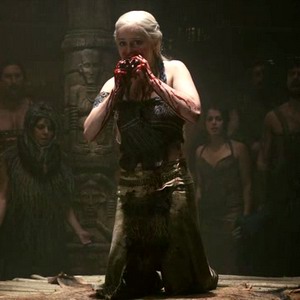
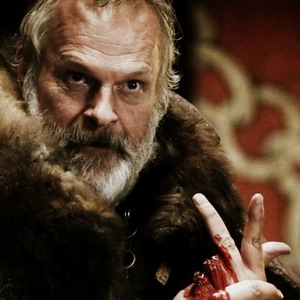
Daenerys eating a horse's heart and GreatJon losing 2 fingers. Stupid!
For a book that claims to be realistic there seem to be an endless array of examples that are the direct opposite. Here are just a few of them:
Yes, in SOME ancient cultures, (the Egyptians most notably,) the monarchs practiced incest to keep the bloodline pure, since they claimed to be gods. It is weird enough that the Targaryens did this in the past, although they did have magic powers, but having Cersei and Jamie Lannister fucking each other and producing offspring this way is quite unnecessary and is surely in the book for the sole purpose of shocking the reader. Martin shocks the reader in a multitude of ways but this one is a cheap shot and I don't applaud it. Certainly it is not realistic
It is true and well known that slavery was wide spread among many cultures, in many places over thousands of years. In this respect it is not unrealistic to make it widespread in the books, BUT, you just know that when George was considering whether or not to put it in, it was ALWAYS going in! He would never pass up any opportunity for the shock of perversion... He knew that perversion sells I guess... America...
Yes, war is violent and cruel, I get it! However the violence in GOT is often far beyond what is required. The examples are legion and it is one of the things that really marks GOT as a PERVERTED work. Some examples include:
Why is Lady Lysa breast-feeding her 6 yo son? Normally weaning begins around 2 years and seeing a 4 yo boy still on the breast is definitely pushing the limit but a 6 yo? Even the most indulgent mother will surely have weaned off her son by then. It's bizarre and surely only put there to shock. It adds nothing to the book except to convince the reader that Lysa and her son are twisted, sick creatures. Yes, another item to add to the turgid list of perversion for the sake of shock.
You've got to wonder: Why produce all this sick perversion? Is Martin harbouring a fetish for all these perversions or is he simply pandering to the twisted perversions of a sick American populace? Perhaps it's both. I don't know. I don't live there. Don't expect me to subscribe and partake...
Tolkien had good and evil, honour and corruption, peace and war but perversion was NEVER fetishised! This stuff... It's just wrong people... Wrong!
If there is one thing that George Martin does well it is PLANNING! It took him 2 years to write GOT and the reason is that he wanted the time to GET IT RIGHT! If you don't plan your book properly you will wind up with contradictions and impossibilities in the various plot lines and character arcs that you will NOT be able to resolve once the first volume is published.
When you read GOT it is immediately clear that you are in the hands of someone who knows where he is going, regardless of whether you like the direction. Like other writers of best-sellers he knows how to pace the book and where to trim away the fat.
He makes sure each chapter is worthwhile and he also builds tension well over the course of the book until it explodes into warfare towards the end. This is very similar to the way that Tolkien builds the tension in LOTR. To be fair though, this strategy has been employed by numerous writers through the ages long before Tolkien arrived...
Also like LOTR, most of the main characters begin the tale all together in the one place: "Winterfell", (as opposed to "Rivendell",) and they then go their separate ways, bringing the reader to all the many places of the world and launching a whole raft of individual story arcs. Also, like Tolkien, many of the characters that survive come back together in the one place at the end of the tale. This doesn't happen in this book but it does in a much later one. This worked brilliantly for JRR and it works brilliantly for GRR.
There are a lot of events, a lot of places, a lot of characters and a lot of stories to tell and they are all interwoven and interdependent. Martin handles all of it deftly, thanks to his careful planning. He says that he worked out the map and the characters and houses after he had written the first chapter. No doubt he had the guts of the plot worked out long before he finished GOT. If you are going to write a really complicated plot then you MUST plan it out. The more detail the better! Sure, you lose spontaneity BUT you get a story that hangs together.
Can it be that this lack of spontaneity engenders boredom in the reader? Certainly I did NOT find it to be a great page-turner and one reason for that is that it did NOT flow for me. Tolkien was more spontaneous with LOTR. He didn't know where he was going when he began it. Yes, he had all the background of languages, cultures, and history in which to set the work but NOT the plot, or at least, not MOST of the plot. As he says: "It was a tale that grew in the telling." One can see this when he says that he was stumped for a long time when he reached the Chamber of Mazarbul in Moria. That is quite far in and he had not yet decided what happened next.
Perhaps this is one reason why I find LOTR much more readable than GOT. Perhaps, but ASOIAF will presumably be 2.1 million words, as opposed to LOTR's 450,000... almost 5 times the size! Plus there are many more characters and plot lines. There is at least an order of magnitude more potential plot holes to be avoided in such a monster work, so I don't blame George for planning it all out in advance.
Actually, I don't know that George planned it out ALL THE WAY to the end. He's been working on "The Winds of Winter" for 14 years at the time of my writing this. It seems that he has a MAJOR problem. Perhaps he has found one or more intractable plot holes that he just can't solve... I haven't heard George talk about what the problem is but I'm guessing that he has a goal in mind that he can't achieve with the story as it stands. Then again: Perhaps he can't make up his mind as to what the end should be... Or perhaps he has simply lost interest in the series and just wants to spend his fading years eating burritos and watching NetFlix... What would I know?... I'm sure I could solve his problem for him but nobody's going to consult Mr Nobody... are they...
George Martin is nothing if not a disciplined adherent to his list of rules and some of those are:
GOT has 73 chapters averaging around 10 pages each. That's a LOT of chapters and 10 pages is IMO quite short! If you have a short attention span and can't read more than 10 pages at a time this would be ideal. The other books are similar and they are all best sellers so I guess Martin knows his audience...
Most of the main characters have multiple chapters told supposedly from their point of view. The idea is that through this device you get to know them and you only see what they see. This might be a good idea but it is NOT well done! Chapters are NOT narrated by the person named and consequently you do NOT see inside their soul. Instead you simply hear the normal narrative voice of George Martin and see the action from a perspective above the said character's head. Occasionally the narrator tells you what the character is thinking but usually not. Notwithstanding what is claimed, the entire series is just the voice of one narrator and overheard dialogue. Sorry George but this is a FAIL!!
It's not just any fail though, it's a MAJOR problem with the work: False advertising! To be fair, LOTR has the same narrative structure, but it doesn't PRETEND to be anything else. It's a shame George that you didn't implement proper 3rd person narrative though. That would really have been something cool if you had done it well!
Having a different POV each chapter is also problematic in another way: It is confusing for the reader to be jerked off to another storyline EVERY CHAPTER! Other readers might be fine with this but I found it unsettling and I was never able to get into the rhythm of the story. Tolkien has a number of stories to tell simultaneously in LOTR but he stays with each story until it is done before jumping back to another parallel tale. This allows the reader to get right into the flow of the book and makes it easy to just keep reading. It is still annoying when you are jerked back but that only happens a handful of times. In GOT it happens 72 BLOODY TIMES!!! Sorry George but this is another idea that simply did NOT work. I don't care how many sycophants say different. It's a FAIL!
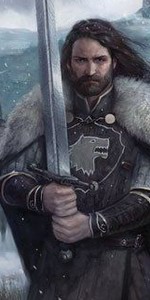
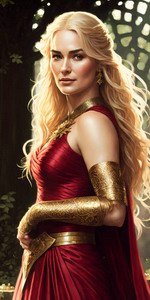
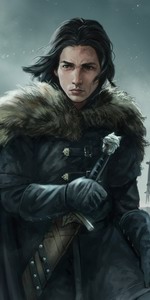
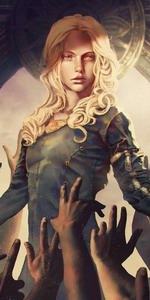
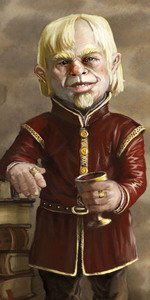
Eddard Stark, Cersei Lannister, Jon Snow, Daenerys Targaryen & Tyrion Lannister.
GOT has MANY characters. You can read their names in the back of the book. Most of these are minor players but there are still quite an imposing array of major ones. Martin's favourites get chapters named after them and there are 8 such characters in GOT. There are also other major players that don't get a chapter: Tywin Lannister, Robb Stark, Joffrey & Robert Baratheon, Petyr Baaelish, Varys, Walder Frey, Drogo, Lysa Arryn etc. I am not going to cover them all. I will just touch briefly on Martin's favourites that have the most influence on the story.
Eddard Stark is the Lord of Winterfell, the largest and most northerly of the 7 Kingdoms. He is the personification of honour, bravery, responsibility and competence. He is everything one could wish for in a king. He is perhaps the only character that is completely white. He is a saint, and since Martin despises such characters, he is brutally mistreated and killed off before the end of the first book. This is in contradistinction to Tolkien who keeps his saints: Frodo, Gandalf, Galadriel and Aragorn to the end. The Starks are the good guys. Everyone knows that.
Cersei Lannister is the beautiful and conniving Queen of the realm. With the backing of her father she is the evil force behind the deaths of her husband the King and the framing and execution of Lord Stark. She is devious, amoral and ruthless. She will stop at nothing to see her son on the Iron Throne and to wreak vengeance on any who threaten her power or who attempt harm on her children. She is the terrible golden queen and she represents power obtained and preserved through ANY means necessary. She is one of the villains. She and her father are made from the same stuff. They don't care about the lives of anyone that gets in their way. You are meant to hate them.
Jon Snow is the mystery character. He is putatively the bastard son of Lord Stark but that is a lie. He only becomes important in later books when the dragons appear and we find out who he really is. In the meantime he provides the link to The Wall and the first taste of the terror that is to come with the invasion of the undead under their magical leader: The Night King. Jon is young but brave and he is conflicted, being torn between his duty to his family and vow he made to The Watch. He is there for the girls.
Daenerys Targaryen is the exiled silver-haired princess and ostensibly last in the line of Dragon Emperors that ruled the 7 Kingdoms for generations before they were deposed and destroyed by Robert Baratheon and Eddard Stark. She is the young girl who will awaken to power in later books as the "Mother of Dragons". During GOT she represents the embryo of chaos. We know that she will be important but don't yet know what she will be. We must wait and see. She is there for the boys.
Tyrion Lannister is Martin's favourite character and it shows. Like Gollum and Frodo in LOTR the author uses the small and repulsive to turn the idea of a hero on its head and confound the traditionalists. Like Gollum, Tyrion is neither good nor evil but a bit of both. Like Frodo the small man becomes a wise leader. He is not a dwarf in the Tolkien sense though: incredibly tough and strong but rather, in the real world sense: a person deformed by achondroplasia. Such people are not strong nor agile and have to rely on their brains to survive, something that Tyrion does exceedingly well. He is, perhaps, Martin's alter ego...
Arya Stark is the wild young child with great spirit and bravery who will turn out to be the avenging hero in later books. We don't know why yet but she gets a lot of chapters for a character who seems to have no cards... She represents "Girl Power" along with Cersei Lannister, Daenerys Targaryen, Breinne of Tarth and many others. Personally, I have had enough of "Girl Power" which I find to be generally unrealistic. Certainly a queen like Cersei or a lady like Catelyn Stark can wield great executive power and can be vital in a diplomatic sense but NOT in hand-to-hand combat. That is just silly! George Martin is just appeasing the feminists here and shoring up at least 50% of his potential readership. Sure, I get it George. The book has to make money. I get it! Just don't claim that your fantasy is realistic.
George Martin studied at the school of "How to write a best-seller". He ticks ALMOST all the boxes:
You might want to think that ASOIAF was a spontaneous creation wrought by the divine spark of genius in Martin's brain owing nothing to anything beyond the pure story but no... He planned it all out in advance...
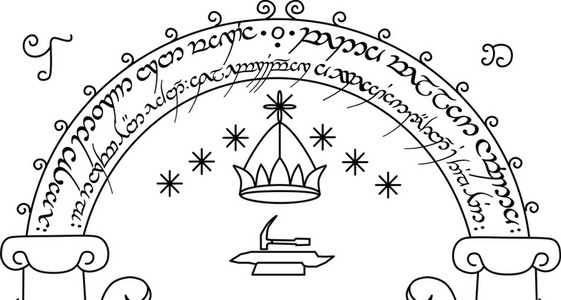
The Elvish inscription on the Doors of Durin: "Ennyn Durin Aran Moria: Pedo Mellon a Minno. Im Narvi hain echant: Celebrimbor o Eregion teithant i thiw hin,"
This is Sindarin, a language AND script invented by Ronald Tolkien. There is nonesuch in GOT.
Martin likes his "ae" usage: "Vaes Dothrak", "Aegon", "Jaehaerys", "Maester" etc. This is a diphthong that is unknown in English and best approximated by "ai" however most English speakers pronounce it "ei" which is quite wrong. Martin would have known this but made a feature of it all the same. He could just as well have written "ei" since he knew how it would be mispronounced but I guess he thought it "looked" good...
This is quite different to Tolkien who used "ae" sparingly, ("Gilraen", "Daeron", "Taur e-Ndaedelos"), but specified that it should be pronounced "ai". He knew how the diphthong should sound and he meant it to be pronounced that way. It was never for looks.
Martin also loves to use "y" instead of "i" or "ai" ("Myrella", "Ilyn", "Varys", "Lyanna", "Alyn", "Harys", "Arryn", "Daenerys" etc), but he doesn't specify which way it should go in any given case. Consider "Tyrion" and "Tywin". They both use the Lannister "Ty" but one is pronounced "Tai" and the other "Ti".
Tolkien specified that "y" was only used as a vowel in Sindarin words, where the elves pronounced it like a French "y" and the Gondorians as "i". It was rarely used by other races and we can assume that in those cases: "Eowyn", "Roheryn" etc, it was borrowed from the wood elves and should be pronounced accordingly. The main other use of "y" as a vowel is in words from the Shire: Goldberry, Bucklebury, Pansy, Poppy, Goodbody, Rory, Toby etc, but these are English translations of the Hobbits' dialect of Westron which was NOT English. Those are NOT their actual names so they don't count. How many people know that Sam's actual name was "Banazir" and Merry's was "Kalimac"? This information is buried deep in Appendix F. Read it! It will change the way you see the hobbits forever... Hobbit English is just translator's English and should be pronounced accordingly.
Martin's names are mostly just corruptions of English names, often with just one letter altered: "Eddard" instead of "Edward", "Joffrey" instead of "Jeffrey", "Petyr" instead of "Peter", Rickard" instead of "Richard" etc. Other names are from assorted European Nations: "Janos", "Boros", "Sandor", "Stannis" etc. This is even true for other things, like titles: "Sir" becomes "Ser". It is a cheap way to give the illusion of a foreign country and also an easy way to create new names. He does also create many names from scratch but I find this practice confusing: He appears to be trying to have his cake and eat it too.
When Tolkien created names they were completely new, with the exception of Hobbit names which are, as I have mentioned, just a translation. This is also an attempt to have one's cake and eat it too but at least Tolkien goes to the trouble of attempting to justify it...
Martin throws in a few lines of Dothraki in the book but he never went to the trouble of devising the entire language as Tolkien did with Elvish and partially with Dwarvish, Orcish, Westron and Rohirrim. Tolkien's names are loaded with etymology that not only sounds right but reveals more about his world the deeper you look into it. Martin's are not. The Dothraki and Valyrian languages that you hear in the HBO series were invented by David J Peterson.
This is an area where Tolkien is FAR ahead of Martin. Tolkien was a career philologist and Professor of Anglo-Saxon Languages at Oxford. He was the real deal in this respect, unlike Martin who is just an author and it shows. You can't blame Martin for not having this skill but it does give LOTR an extra layer of credibility and greatness that ASOIAF simply doesn't have.
Martin is no hack, he writes well overall but his literary style is lacking in anything exceptional. It is above average but it never hits the heights achieved routinely by the greats. For example:
Beyond the castle walls, a roar of sound went up. The foot-soldiers and townsfolk were cheering Robb as he rode past, Bran knew; cheering for Lord Stark, for the Lord of Winterfell on his great stallion, with his cloak streaming and Grey Wind racing beside him. They would never cheer for him that way, he realized with a dull ache.
Compare this with a similar passage from The Lord Of The Rings:
Together the Elf and the Dwarf entered Minas Tirith, and folk that saw them pass marvelled to see such companions; for Legolas was fair of face beyond the measure of Men, and he sang an elven-song in a clear voice as he walked in the morning; but Gimli stalked beside him, stroking his beard and staring about him. "There is some good stonework here," he said as he looked at the walls...
Martin's prose is not bad, certainly not! It is serviceable and workmanlike... but it is not GREAT. Great prose lifts the reader and fills the experience with pleasure that makes one want to continue. Run-of-the-mill prose is like reading the newspaper: You only do it to discover what happened. So it is with George Martin: You only read it for the plot.
Some writers are masters of dialogue and some are not. A true master's dialogue will sound so convincing and each character's voice so individual that you can hear them in your head and instantly recognise them from the words alone. This is not the case with George Martin. Here are some examples:
Lysa glared at him, "You demanded a trial by combat."
"And now I demand a champion, such as you have chosen for yourself. My brother Jamie will gladly take my part, I know."
"Your precious Kingslayer is hundreds of leagues from here," snapped Lysa Arryn.
"Send a bird for him. I will gladly await his arrival."
"You will face Ser Vardis on the morrow."
This is not bad. It does the job and in the hands of quality actors will work just fine on the screen, but compare it to Tolkien:
"He is nearly spent," said Aragorn turning to Gandalf. "But this comes not from the wound. See! that is healing. Had he been smitten by some dart from the Nazgul, as you thought, he would have died that night. This hurt was given by some Southron arrow, I would guess. Who drew it forth? Was it kept?"
"I drew it forth", said Imrahil, "and stanched the wound..."
Both do the job but there is poetry and poise in Tolkien's dialogue that is missing from Martin's. Martin's feels rushed...
In my perception it is hard to distinguish between Martin's characters purely from their speech. They all sound much the same with just a few exceptions:
Robert Baratheon: "Let me tell you a secret Ned. More than once, I have dreamed of giving up my crown. Take ship for the Free Cities with my horse and my hammer, spend my time warring and whoring, that's what I was made for."
Petyr Baelish: "This? A sweet piece of steel, but it cuts two ways, my lord. The Imp will no doubt swear the blade was lost or stolen while he was at Winterfell, and with his hireling dead, who is there to give him the lie?
Eddard Stark: "Lord Baelish, I am a Stark of Winterfell. My son lies crippled, perhaps dying. He would be dead, and Catelyn with him, but for a wolf pup we found in the snow. If you truly believe I could forget that, you are as big a fool now as when you took up sword against my brother."
Tywin Lannister: "Your brother has been covering himself with glory, He smashed the Lords Vance and Piper at the Golden Tooth, and he met the massed power of the Tullys under Riverrun, where Jaime has them under siege. The rest fled to their strongholds."
Maester Aemon: "A craven can be as brave as any man, when there is nothing to fear. And we can all do our duty, when there is no cost to it. How easy it seems then, to walk the path of honour. Yet soon or late in every man's life comes a day when it is not easy, a day when he must choose."
Daenerys Targaryen: "You will be my khalasar. I see the faces of slaves. I free you. Take off your collars. Go if you wish, no one shall harm you. If you stay, it will be as brothers and sisters, husbands and wives. I see the children, women, the wrinkled faces of the aged. I was a child yesterday. Today I am a woman. Tomorrow I will be old."
Tyrion Lannister: "Father, it warms my heart to think that you might entrust me with... what, twenty men? Fifty? Are you sure you can spare so many? Well, no matter. If I should come across Thoros and Lord Beric, I shall spank them both. ... First though, I have some promises of my own to keep. I shall require 3,000 helms and as many hauberks, plus swords, pikes, steel spearheads, maces..."
Shagga: "Shagga son of Dolf likes this not. Shagga will go with the boyman, and if the boyman lies, Shagga will chop off his manhood-"
Only Tyrion and Shagga have voices that are instantly recognisable in isolation. Martin himself said that Tyrion's dialogue was the hardest to write and this is because it is the only case where his dialogue rises above workmanlike.
Another thing that LOTR has that GOT does not is SONGS! There are 46 of them scattered throughout the books and some have different verses added at different points in the story. They are POETRY that songsters such as I can set to music and perform. They are a link to the past where people couldn't read, there were no video screens and legends were sung by bards or enacted in plays. They are VITAL to communicate an heroic saga properly. Tolkien knew that and made a feature of it. Consequently LOTR has numerous varied songs that carry the varied emotion of tale. You may not have heard them done well but for the true believer, trust me: My settings will bring the emotion to your heart and the tears to your eyes! The same alas, can never be true for GOT and it is the weaker for it...
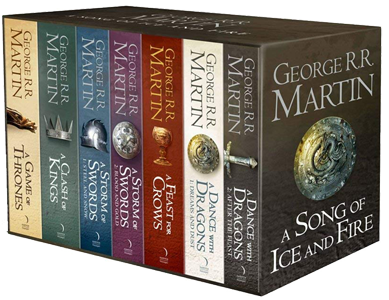
"A Song Of Ice And Fire" boxed set (still two more volumes to come...)
It's no secret that ASOIAF is VERY long!!! Should it ever be finished its length is expected to be around 6050 pages and 2.1 million words! What is the point? Tolkien achieved perfection in 450,000 words... and LOTR was considered LONG at the time... Why would anyone think that something 5 times longer would be better? "Bigger is NOT necessarily better." is a common aphorism throughout the world but perhaps not in the USA. "Super size me already!"
Sadly it's become a fashion, presumably dictated by publishers who see that more words and more books equals more money. "Don't worry about the quality: Feel the width!". So it is that the modern fantasy genre is plagued by endless series of over-blown volumes: Joanne Rowling's "Harry Potter", Robert Jordan's "Wheel Of Time", (4.3 million words!) and Brandon Sanderson's "Stormlight Archive", which is already 2.3 million words and projected to double that, just to name 3.
Let me spell it out people: "Bigger is NOT necessarily better." Fuck the quantity: "GIVE ME QUALITY!!!" I'd rather read 150 pages of "The Hitch-Hikers Guide To The Galaxy" than 800 pages of "A Game Of Thrones". As for force-feeding myself the entire ASOIAF series: NO! I'm not doing it! I refuse! GOT was enough. I agree with "Rockin' Ronnie": 450,000 words is plenty.
Not only is ASOIAF too long for me to be bothered reading it's clearly also too long for George Martin to be bothered finishing! If I were to make a guess I would say that he is done with it... and who can blame him?
If you can't say what you want to say in 500,000 words then maybe you shouldn't say it at all...
GOT is ok. Like most best-sellers, it's a decent read. It's written in a solid, workmanlike prose with great attention to character and plot and it is set on a grand stage. It draws heavily from European middle ages warfare and history and it's laden to the gunwales with political intrigue, violence and perversion.
If perversion gets you off then this is your bag. Dive in and suck it down for all you're worth! If, however, like me, you find perversion repulsive, then you should avoid this book entirely. Americans seem to revel in perversion, whether it be: extreme violence, sadism, insanity, bizarre sexual practices, abuse, foul language, slavery, thievery, lying or just the act of sticking a knife into your ally's back. I've certainly noted this tendency in American fantasy over the decades and I can't say that I've enjoyed it. In fact, it has turned me off ALL works of modern fantasy because I REALLY can't stand it. I knew GOT was going to be perverse. I only read it so that I could judge this famous work fairly.
George Martin is NOT in the same league as Tolkien. Martin's style is no better than workmanlike. His dialogue the same. There is no poetry, no song and no proper foreign languages. His world building and planning are very good but they don't have the depth that you will find in LOTR thanks to the Silmarillion. Finally ASOIAF is FAR too long and filled to the brim with twisted perversion: A sick work for a sick audience.
The Lord of the Rings is a FAR better book which I put at the top of my list of ALL books. ASOIAF would not even make my top 100.
A twisted, over-weight best-seller. American style!
3/5
Warren Mars - March 13, 2025